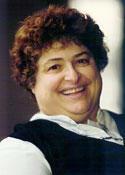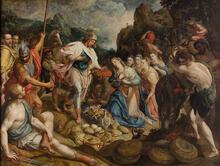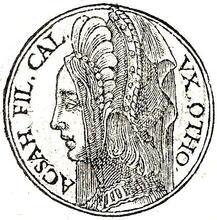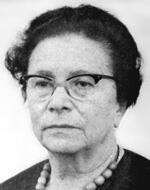Widow of Zarephath: Bible
Ninth century B.C.E. prophet Elijah is described as concerned for the oppressed and the socially marginalized in the story of the widow of Zarephath. In the first and third episodes of 1 Kings 17, Elijah aids a widow and her son. After the third section, the widow become a follower of Elijah’s God, illustrating the broader message that as the Israelites commit themselves to God, God will provide for them.
Article
Narratives about the ninth-century B.C.E. prophet Elijah are found in 1 Kings 17–19 and 21 and in 2 Kings 1–2. Like his successor, Elisha, he is depicted as having many of the attributes of Israel’s later prophetic figures. One of these characteristics—concern for the oppressed and socially marginalized—is revealed in the story of the widow of Zarephath. The narrative of 1 Kings 17 contains three episodes that serve to introduce the figure of Elijah.
After an introductory section (1 Kgs 17:1–7) in which YHWH announces a drought and commands ravens to feed the prophet, an episode unfolds concerning a widow living in a non-Israelite village near Sidon during the drought (1 Kgs 17:8–16). The prophet requests food, but the woman is unable to acquiesce. She plans to prepare a meager meal for her son and herself with her few remaining supplies and then die. Autonomous widows, unless their spouses and fathers were wealthy, were socially and economically marginalized, barely able to survive in times of plenty and clearly at-risk during droughts. In this case, the prophet as miracle worker saves the widow and her son. Invoking God’s authority, Elijah causes her jar of grain and jug of oil to be miraculously replenished until the drought ends.
In a third episode (1 Kgs 17:17–24), which may originally have been a separate narrative because the woman does not seem as poor as the one in vv. 8–16, the widow’s son dies. She seems to blame the prophet for her son’s death, or perhaps for suggesting that his death was the result of a transgression of her own. Elijah invokes divine help and stretches himself out on the corpse. The child is brought to life, and the foreign widow becomes a follower of Elijah’s God.
These stories of miracle working, which make Elijah a favorite prophetic figure in the New Testament, are artfully situated in their Kings setting. They connect narratively to an earlier event in which Jeroboam’s wife tries to save her sick son (1 Kgs 14:2–18). And they effect a transition to Elijah’s larger national mission. A foreign widow—socially marginal and religiously outside the true community of God—is fed, her son is brought to life, and she acknowledges YHWH. The individual incident prefigures the national message. God will provide for the Israelites and give them life; they must commit themselves to God.
Camp, Claudia. “1 and 2 Kings.” In Women’s Bible Commentary, edited by Carol A. Newsom and Sharon H. Ringe, 96–109. Kentucky: 1992.
Meyers, Carol, General Editor. Women in Scripture. New York: 2000.
Siebert-Hommes, J.C. "The Widow of Zarephath and the Great Woman of Shunem. A comparative Analysis of Two Stories Book." In Reading Prophetic Texts. Gender-specific & Related Studies in Memory of Fokkelien van Dijk-Hemmes, edited by Bob Becking and Meindert Dijkstra, 231-250. Leiden: E.J. Brill, 1996.
Wyatt, Stephanie. "Jezebel, Elijah, and the Widow of Zarephath: A Ménage à Trois That Estranges the Holy and Makes the Holy the Strange." JSOT 36, no. 4 (2012): 435-458.









